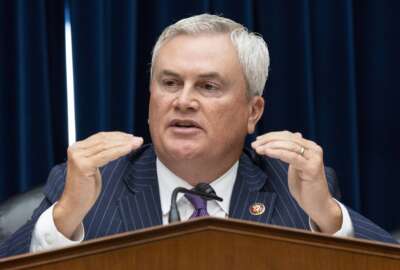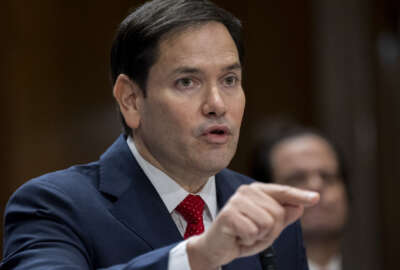Hurricane Helene may disrupt Congress’ plans to be out of session
"A lot of lawmakers just don't want to come back to Washington and argue over federal funding," WTOP Capitol Hill correspondent Mitchell Miller said.
Congress may have taken off after passing a brief spending measure, but some are calling for it to return. That would be to deal with the needed emergency relief funding related to Hurricane Helene. There’s also the election in the coming weeks that has some members looking into the logistical details of federal agencies involved in that process. For an update on all of this, the Federal Drive with Tom Temin welcomed WTOP Capitol Hill Correspondent Mitchell Miller.
Interview transcript:
Eric White Congress may have taken off after passing a brief spending measure, but some are calling for it to return to deal with the needed emergency relief funding related to Hurricane Helene. There’s also the election in the coming weeks that has some members looking into the logistical details of federal agencies involved in that process. For an update on all of this, we welcome back to the program WTOP Capitol Hill correspondent Mitchell Miller. Mitchell, thank you for taking the time. So let’s get into it. Congress is out right now, but some of them are itching to get back in. What can you tell me about that?
Mitchell Miller Right. So as the damage just expanded across the southeast and in parts of southwest Virginia, many lawmakers started to say, wait a second, we can’t be out of Congress for this long. We can’t be out of session. We need to get back to Washington. So last week, a group, a bipartisan group of senators wrote to the Senate leadership and said, we want you to get us to get back into session. They included Virginia Senator Mark Warner and Virginia Senator Tim Kaine, who has also gone out to southwestern Virginia and surveyed a lot of the damage out there. Very similar situation to what you’ve heard from other states, including North Carolina. And basically, they’re saying it is time to come back sometime in the next few weeks to address the emergency disaster aid funding. Now, what happened before Congress broke and they’re not coming back until early November is they approved the government shutdown stopgap measure that avoided the shutdown. But what they didn’t do was they did not add any additional funding for emergency disaster aid. And so, as a result, many lawmakers are concerned, Democrats and Republicans, that eventually this money is going to run out, that FEMA is going to need it. Right now, FEMA says it has enough money to deal with the immediate needs of these states. But certainly we’re going to get estimates in the billions and billions of dollars continuing to go up. And there has not been any indication, however, that the congressional leadership is going to bring them back. President Biden has kept that door open, saying he might ask for them to do that. But at this moment, I remain somewhat skeptical that this will actually happen just because, as you know, the churn and all the drama of the political campaign is taking place right now and a lot of lawmakers just don’t want to come back to Washington and argue over federal funding.
Eric White It’s obviously, you know, terrible tragedy. Hundreds of thousands have been affected by this. And making it all the more stranger is that the path that Helene took went into areas where hurricanes don’t usually go to. So you probably have some lawmakers who have never been through this before and may be wanting to get back to Washington just so they can talk to their colleagues who, you know, are from Florida and the Georgias and Mississippis, so that they may be able to pick their brain about it.
Mitchell Miller Right. It reminds me of several years ago when we had Hurricane Sandy go up through the East Coast and a lot of lawmakers were in a similar situation there where they were just not used to this happening, at least on this level. And so that’s why you do have a lot of members of both parties from several states saying that they really do want to get them back. And if they don’t come back, you can be certain that they’re going to be pushing really, really hard to get more emergency assistance. Obviously, there have been emergency declarations by the president, which have helped to get a lot of the resources to these states. But the demand is just going to keep going up and up as we move into later into the year and actually in the years ahead, really.
Eric White You mentioned the political climate that is casting a shadow over all of this. It’s never a good look during election season to not be in session when something like this is going on. What more can you tell you about what’s factoring into that? And then we can get into the election details themselves?
Mitchell Miller Well, there’s the situation before they left town was they did not want to, of course, have a government shutdown right before the election. So what they did was they essentially went with a clean C.R. continuing resolution, which kept the funding level essentially the same as it’s been all year. And while that is fine for getting them out of town and getting them on to the campaign trail, what it also does is, of course, leaves everything sort of status quo. And before they left, FEMA had actually asked, along with the White House, for billions of additional dollars to deal with emergency assistance aid, and they didn’t come up with it. So that kind of left them in the situation that they are now. And what that means, of course, is when the election is finally over and they do come back from the lame duck session, they are going to have a lot of huge issues to take up when they get back.
Eric White That’s WTOP Capitol Hill correspondent Mitchell Miller. Speaking of the election itself, there is some concern on the Hill regarding the agencies that are involved in actually participating or conducting the election That will be happening. And one of them is obviously mail in ballots. That is factoring in for a larger and larger percentage of the votes that a lot of these members get in the presidential election. What can you tell me about the concerns that some members are having about whether the Postal Service is going to be ready for what will probably be another high influx of mail in ballots?
Mitchell Miller Right. There’s been a lot of concern about this really for months. There were congressional hearings. There were calls from members of Congress for the postmaster general to make sure that everything was all set. As you know, ever since the pandemic, there has been a surge in mail in ballots and a lot of states have had to ramp up in connection with this. And some of the states, in fact, the secretaries of state actually told members of Congress that they were concerned that the Postal Service wasn’t going to be ready for all of this. Now, the postmaster general, Thomas DeJoy, has said that they are ready, that they are doing what they were supposed to do. And this is, of course, happening right now. Many states have already begun their mail in ballots, so the voting has started to take place. But there are still concerns among lawmakers as well as, interestingly enough, the American Postal Workers Union last week actually called for public help to try to improve staffing, get better customer service and to deal with some of these issues related to mail in ballot balloting. I think part of it is they are using the leverage of the fact that the election is coming up in just a few weeks to get more attention to a lot of the issues that they’ve been pushing for quite a while. And they raised this issue. They had some rallies across the country. So it’s an interesting situation that the Postal Service itself, at least the union of the Postal Service, was raising some red flags about this. So we’re going to have to see what happens in the weeks ahead. But lawmakers that I’ve spoken with, including Senator Mark Warner, have indicated they are keeping a very close eye on this. Virginia, one of the places where there have been problems in the past where mail has just been misplaced or it takes many, many more weeks than it should to get delivered. Initially, those concerns related to the fact that people might be getting medicine through the mail or other important financial information. And now we’re shifting, of course, to the election and the fact that everybody’s vote does count. And lawmakers certainly want to make everyone’s vote count as the election moves forward to November 5th.
Eric White Only because it’s related. And it came as a curveball to a lot of us who don’t cover it all the time. The EPW isn’t the only union asking for attention. The ongoing difficulties between port of the strikes going on in many ports that could occur even in this area. Have you spoken with anybody on the Hill regarding that? I’m sure that it is right up their alley of what they will be concerned about, especially again, in an election season.
Mitchell Miller Absolutely. Especially the lawmakers here in our region from Virginia and Maryland, of course, big port cities in both of those states, they are really concerned about how long this might last for now. Many of them, there are Democrats. They are deferring to the White House and seeing what is going to be done. They have kind of held back on saying whether or not the president should get himself more involved with trying to resolve this. But certainly a lot of concerns about this. I mean, just look at the port of Baltimore where you literally had the key bridge collapse more than six months ago and has just been trying to get up to speed. And now you have this huge strike which is causing problems, by the way, as an aside, in connection with trying to get money for the key bridge that is actually going back kind of full circle here, tied to the disaster aid relief that lawmakers from Maryland are trying, thinking they may be able to get the last bit of money that they need for what will be a nearly $2 billion bridge, this final 10% from through legislation that would be through that disaster aid bill. So they certainly have a lot of balls in the air right now as they try to figure out what’s going to happen in the weeks ahead.
Eric White That’s WTOP Capitol Hill correspondent Mitchell Miller giving us the skinny on Capitol Hill. Mitchell, thank you so much.
Mitchell Miller You bet.
Copyright © 2025 Federal News Network. All rights reserved. This website is not intended for users located within the European Economic Area.
Tom Temin is host of the Federal Drive and has been providing insight on federal technology and management issues for more than 30 years.
Follow @tteminWFED






